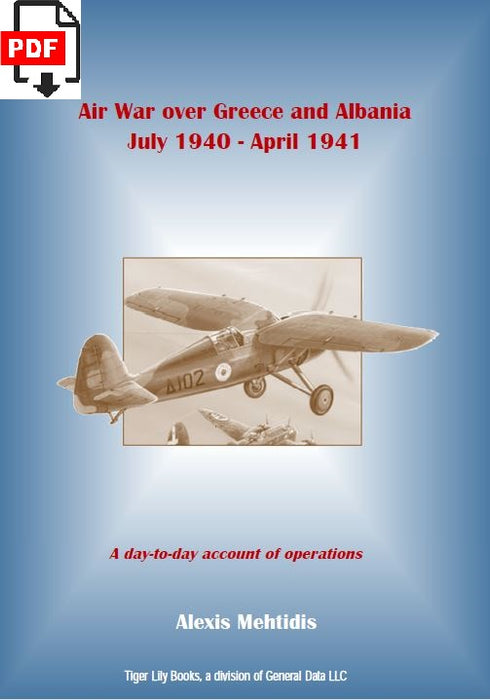
Mehtidis, Alexis - Air War Over Greece and Albania (1940-1941) (ebook) (ebook)
Air War Over Greece and Albania - 1940-1941
A day-to-day account of operations
Alexis Mehtidis
Lovers of easy thrillers, pass your way. Historians looking for clinical information, this is for you.
An impressive 126-page chronology of air operations between July 8, 1940 and April 30, 1941, the end of Operation DEMON which marked the total evacuation of the Allied forces from Greece to Crete and then to Egypt.
Interesting and complex operations, since they involved no less than seven air forces (Albanian, Yugoslav, Greek, British, Italian, German and even Turkish to a very minor degree) and all types of operations: hunting, bombing, reconnaissance, transport, parachuting, mining, attack at sea, torpedo, seaplanes, ASW, electronic warfare, etc...
What strikes at first is that the air dominance seems to be British until the Luftwaffe enters the conflict.
The second element that appears in Prof. Mehtidis' lines is the number of different types of aicraft. True, the Blenheim, Gladiator, Wellington, Z.1007, CR.42, Bf.109, Ju-52 (on both sides!) and Stuka were omnipresent, but a myriad of other types of aircraft (P.24, Bombay, Hurricane, Spitfire, Z.506, Breguet XIX, Potez 25A, Bloch MB.315, He111, etc.) must have transformed the daily life of the logisticians of each belligerent into a permanent nightmare.
It soon becomes clear that everyone is crossing the Mediterranean in all directions: the Italians are attacking Crete from Libya; the Germans are trying to mine the Suez Canal from Rhodes; Greece is supported by British convoys from Alexandria and Port Said and from the air bases at Mersa Matruh and Malta; the Yugoslav air force is taking refuge in Aboukir. In addition, the extensive pages on the air operations of the naval battle of Cape Matapan amply illustrate this concept.
Albania, as such, does not seem very interesting: it serves as a battleground, a glacis delaying the invasion of mainland Greece, but not really a strategic target. And it is only once the Luftwaffe has finished in the Yugoslav sky (and King Peter has fled to Greece, then to Egypt on board an RAF Bombay), that the Bf.109s will have their hands free to sweep everything in Greece.
Neophytes will learn a lot of interesting things over the pages: about the British “satellite airstrip” technique for dispersing the Hurricanes around the Larissa base; about their ability to intercept "Ultra" messages warning of an impending attack on Rhodes; about the role of the Metaxas line of defense and the Rupel fortifications; about the total disrespect for hospital ships; or on the German airborne operations on the Corinth Canal to cut off mainland Greece from the Peloponnese and prevent the British retreat; and, of course, on the differences between the Greek Commander-in-Chief and the RAF, the latter refusing to operate in tactical support of the Greek land forces.
The last chapter is devoted to the victories claimed and losses admitted by the RAF, JKRV, RHAF, FAA, Regia Aeronautica, and Luftwaffe respectively: a vivid demonstration of the difficulty of the historian's work, because - inevitably - nothing matches.
Through the simple chronological succession of aerial actions, one enters this campaign, mentally builds up an overall vision of it and starts to wait for the rest of the story. In the end, thriller fans will also find something to their liking.
126 pages – in English





